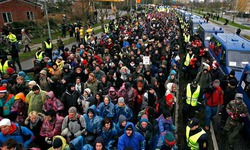Police fire tear gas and arrest protesters who try to storm Copenhagen summit
Police fired tear gas and made at least 200 arrests today as thousands of climate change activists tried to breach security at the UN environmental summit in Copenhagen.
Groups of protesters arrived at the summit as world leaders including Hugo Chavez of Venezuela and Zimbabwe’s Robert Mugabe gathered for a final push towards an agreement to tackle global warming and had planned to storm the venue, including the main negotiating hall.
But they were stopped at police barricades as they arrived at Bella Centre, the sprawling conference venue on the outskirts of Copenhagen.

A Times reporter who was trapped with a group of around 2,000 protesters in a police tactic known as “kettling” said that officers were charging demonstrators and using pepper spray to break them up. Danish police have arrested hundreds of people over the past week and have been accused of being unnecessarily heavy-handed.
As the demonstrators arrived today, large numbers of police were waiting for them, many with dogs on leashes, and a police helicopter circled over head.
The police were also using plain-clothed officers to infiltrate the protests, grabbing individual protesters and bundling them into police vans.
There were also demonstrations inside the centre, including a sit-in by about 100 NGO representatives angered by accreditation delays and a Danish decision to cancel the badges of delegates from Friends of the Earth.
Gordon Brown arrived at the conference last night, the first major world leader to do so, and met the Australian Prime Minister Kevin Rudd at a Copenhagen hotel. Both he and Mr Rudd – who is actively involved in the negotiations as a “friend of the chair” – warned that a deal was not guaranteed.
The Prime Minister met the UN Secretary-General Ban Ki Moon this morning and had a full slate of bilateral meetings during the day to try to sort out the long-term financing of an agreement.
By the end of the day, about 100 world leaders are expected in town, including President Mugabe of Zimbabwe, Israel’s Binyamin Netanyahu and President Sarkozy of France.
But President Obama, whose accord will be crucial if the summit is to come up with a meaningful agreement that could be translated into a binding international treaty next year, will not arrive until Friday and has left it to officials to hammer out an accord on how much the United States will reduce its emissions and how much it will be allowed to offset its emissions on the global carbon market.
Arriving in Copenhagen, Mr Rudd said that the talks were at a crucial juncture.
“There’s no guarantee of success. Let’s just be straight up and down about this,” he told reporters.
“You’ve got 190 countries who are participants in this conference. You’ve got more than 100 heads of government. You’ve got the rolling sound and light show of what happens on the conference floor. “There is no guarantee of success.”
Mr Brown agreed that the talks were “very heavy weather”.
“It is an uphill struggle, there is a huge amount to be done. The reason I came here early is because I used to deal with 20 nations when we had the G20, we are dealing with 192 nations and they have all got to agree,” he told GMTV this morning.
“This deal matters for Britain. I think if we could get a carbon change, then it is worth about half a million jobs to Britain in the longer run, so it is worth it for jobs.
“But I also think our children, growing up, going to school every day, I don’t want them to live in a world of floods, of droughts, of extreme weather. It is really important, therefore, for Britain that we get this deal and it is important that I do everything I can in the next few days to make that possible.”
Source: http://www.timesonline.co.uk/tol/news/environment/article6958680.ece



